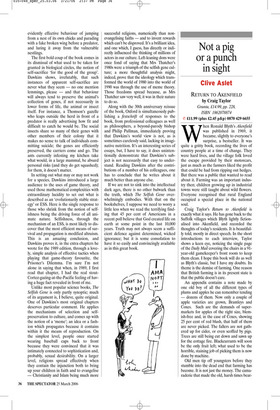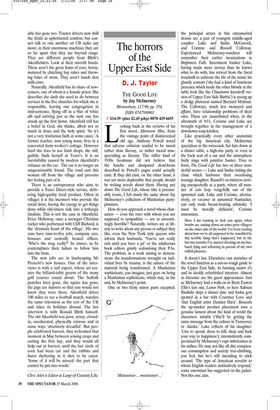Not a pig or a punch in sight
Clive Aslet
RETURN TO AKENFIELD by Craig Taylor Granta, £14.99, pp. 228, ISBN 1862078874 ✆ £11.99 (plus £2.45 p&p) 0870 429 6655 When Ronald Blyth’s Akenfield was published in 1969, it became, slightly to everyone’s surprise, a bestseller. It was quite a gritty book, recording the lives of country people at a time of change. They were hard lives, and the village folk loved the escape provided by their motorcars, just as much as the farmers liked the profit that could be had from ripping out hedges. But there was a public that wanted to read about it. Farming was an important industry then; children growing up in industrial towns were still taught about wild flowers. Everyone recognised that rural England occupied a special place in the national soul.
Craig Taylor’s Return to Akenfield is exactly what it says. He has gone back to the Suffolk villages which Blyth lightly fictionalised into Akenfield, and recorded the thoughts of today’s residents. It is beautifully told, mostly in direct speech. In the short introductions to each interview, Taylor shows a keen eye, noticing the single page of the Daily Mail covering the chairs in a 91year-old gamekeeper’s front room to keep them clean. I hope this book will do as well as Blyth’s classic, but I have my doubts. Its theme is the demise of farming. One reason that British farming is in its present state is that the public doesn’t care.
An appendix contains a note made by one old boy of all the different types of plums and apples he can remember tending — dozens of them. Now only a couple of apple varieties are grown, Bramleys and Coxes. Such are the demands of supermarkets for apples of the right size, blemish-free and, in the case of Coxes, showing 25 per cent of red blush, that half of them are never picked. The fallers are not gathered up for cider, or even scoffed by pigs. Trees are still being cut down and sawn up for the cottage fire. Blackcurrants will soon be the only fruit left; what used to be the horrible, staining job of picking them is now done by machine.
Old men tip off youngsters before they stumble into the dead end that farming has become. It is not just the money. The camaraderie that made the old, harsh times bear able has gone too. Tractor drivers now drill the fields in upholstered comfort, but cannot talk to one another on CB radio any more; in their enormous machines they are so far apart that they are beyond range. They are different people from Blyth’s Akenfielders. Look at their smooth hands. These aren’t the great hams of yore, horny, matured by clutching hay rakes and throwing bales of straw. They aren’t hands that milk cows.
Naturally, Akenfield has its share of newcomers, one of whom is a female priest. She describes the dash she used to do between services in the five churches for which she is responsible, leaving one congregation in mid-sentence, flying off in a blur of white alb and arriving just as the next one has struck up the first hymn. Akenfield still has a belief in God, she thinks, albeit not so much in Jesus and the holy spirit. ‘So it’s not a very trinitarian faith in some cases.’ A former teacher, now young mum, lives in a renovated farm worker’s cottage. However hard she tries to use farm shops, she still, guiltily, finds herself at Tesco’s. It is an inevitability caused by modern Akenfield’s reliance on the car. The car is no longer an unquestionable friend. The road cuts this woman off from the village and prevents her feeling part of it.
There is an entrepreneur who aims to provide a Tesco Direct-style service, delivering high-quality local produce. Often in villages it is the incomers who provide the social drive, having the energy to get things done while old-timers sink into a lethargic fatalism. This is not the case in Akenfield. Peter Holloway, once a teenager Christian rocker who performed with Cliff Richard, is the ‘dramatic heart of the village’. His two sons have nine-to-five jobs, company cars, bonuses and centrally heated offices. ‘Who’s the mug really?’ he muses, as he contemplates their failure to follow him into the farm.
The new jobs are in landscaping Mr Prescott’s new houses. One of the interviews is with a turf expert, whose art creates the billiard-table greens of the many golf courses round about. The Suffolk punches have gone, the squire has gone, the pigs are indoors so that you would not know they were there. Akenfield drives 100 miles to see a football match, watches the same television as the rest of the UK and takes its holidays abroad. The last interview is with Ronald Blyth himself. The old Akenfield was poor, nosey, closedin, uneducated, physically ruinous and in some ways ‘absolutely dreadful’. But people celebrated harvest, they welcomed that moment in May between sowing crops and cutting the first hay, and they would all help out at harvest, until the last circle of corn had been cut and the rabbits and hares sheltering in it shot to be eaten. ‘Some of it will be missed: the part that cannot be put into words.’
























































 Previous page
Previous page